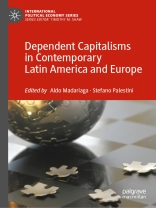This book contributes to the current revival of dependency approaches for the analysis of global capitalism. Reflecting on contemporary uses of the “Dependency Research Program” (DRP) and a refined analytical toolkit, it makes two distinctive contributions to this revival: the analysis of new “situations of dependency”, and the understanding of the “mechanisms of dependency”. The individual chapters draw from a wide range of cases and data from Latin America and Europe and imbricate concepts and ideas from the DRP with those of other approaches, from post-Keynesian economics to structural economics, institutional economics, regulation theory, comparative capitalisms, business politics, economic geography and critical finance studies, providing a rich array of possibilities for virtuous inter-disciplinary cross-fertilization. This volume is a valuable contribution for those interested in understanding how global capitalism works in Latin America, Europe and beyond.
قائمة المحتويات
Introduction. Dependency as a research program: from situations to mechanisms of dependency.- 1. A dependency perspective on the United States, China and Latin America.- 2. The deformation of the core by dependency relations: The case of Germany in Europe.- 3. Mechanisms of Dependence: Conceptualising the Latin American Dependency Research Program for the Analysis of European Capitalism.- 4. Who are the super-exploited? Gender, Race and the intersectional potentialities of dependency theory.- 5. The political economy of the post commodity boom crises in Latin America.- 6. Dependency, development and the politics of growth models in Europe’s peripheries.- 7. From situations of dependency to varieties of illiberalism: the exhaustion of democratic dependency governance and the rise of illiberalism in Eastern Europe.- 8. Dependency, rent and the failure of neo-extractivism.- 9. Dependent Financialization and the construction of peripheral business-power in the Chilean pension system.- Conclusions: rethinking dependency, refining our analyticial tools.
عن المؤلف
Aldo Madariaga is Assistant Professor at the School of Political Science, Universidad Diego Portales. He is the author of Neoliberal Resilience: Lessons in Democracy and Development from Latin America and Eastern Europe (Princeton University Press, 2020), and the winner of the honorary mention for 2021 best book by the IPE section, International Studies Association (ISA).
Stefano Palestini is Assistant Professor of International Relations at the Institute of Political Science, Pontificia Universidad Católica de Chile. His work has been published in international journals such as World Politics, Governance and the Journal of International Relations and Development.












